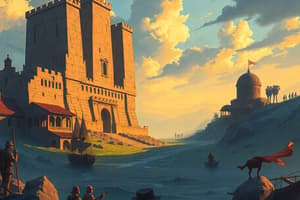Podcast
Questions and Answers
The study of history was significantly influenced by the works of ______ and Ranke.
The study of history was significantly influenced by the works of ______ and Ranke.
Niebuhr
The philosophy of ______ is an important aspect of positivism in history.
The philosophy of ______ is an important aspect of positivism in history.
Auguste Comte
In the twentieth century, ______ emphasized historical relativism among historians.
In the twentieth century, ______ emphasized historical relativism among historians.
Robinson
Structuralism in history was influenced by thinkers such as ______ and Bloch.
Structuralism in history was influenced by thinkers such as ______ and Bloch.
Postmodernism challenges the traditional narratives seen in historical writing and emphasizes ______.
Postmodernism challenges the traditional narratives seen in historical writing and emphasizes ______.
Ancient Indian historiography includes the study of the ______ and Charita: Bana Bhatta, the Harshacharita.
Ancient Indian historiography includes the study of the ______ and Charita: Bana Bhatta, the Harshacharita.
The chief features of pre-Mughal Indo-Muslim historiography were notably documented during the ______ period.
The chief features of pre-Mughal Indo-Muslim historiography were notably documented during the ______ period.
Historiography during the reign of Akbar includes the work titled ______-i-Alfi.
Historiography during the reign of Akbar includes the work titled ______-i-Alfi.
Postmodernist historical writing challenges the concepts established by ______ in historiography.
Postmodernist historical writing challenges the concepts established by ______ in historiography.
The linguistic turn in history is closely associated with theorists like Jacques ______.
The linguistic turn in history is closely associated with theorists like Jacques ______.
Flashcards are hidden until you start studying
Study Notes
Historical Methodology Before Niebuhr and Ranke
- Historical studies lacked rigorous analytical frameworks prior to the contributions of Barthold Niebuhr and Leopold von Ranke.
- Niebuhr focused on developing historical methods based on critical examination of sources.
- Ranke emphasized the importance of primary sources in creating accurate historical narratives.
Barthold Niebuhr and Leopold von Ranke
- Niebuhr is known as a pioneer of critical historical methodology, advocating for scientific rigor in historiography.
- Ranke is often regarded as the father of modern historical writing, promoting the idea of "history as it actually was."
Ranke's Contributions
- Authored significant works that helped to define 19th-century historiography, including "Histories of the Popes" and "The History of the Reformation."
- His method relied on extensive archival research and an emphasis on primary documentation.
Characteristics of Rankean History
- Rankean history is characterized by a focus on empirical evidence, emphasizing the importance of authenticity and factual accuracy.
- It seeks to understand historical events in their specific contexts rather than through contemporary values or interpretations.
Ranke's Seminar
- Ranke's seminar played a significant role in shaping young historians, encouraging critical engagement with primary sources and grounding historical inquiry in a scientific approach.
Assessment of Ranke's Work
- Ranke is both praised for his methodical approach and critiqued for potentially underestimating the influence of interpretive perspectives in historical narratives.
Positivism in Historical Thought
- Positivism asserts that knowledge should be derived from empirical data; it significantly influenced historical methodology in the 19th century.
- Auguste Comte laid the philosophical groundwork for positivism, emphasizing observation and classification in understanding human society.
Key Figures in Positivism
- Henry Thomas Buckle contributed to the application of positivist principles in history, arguing for a systematic study of social factors influencing historical events.
- Karl Marx introduced historical materialism, asserting that material conditions and economic factors drive historical change.
The Twentieth Century Historical Developments
- Scientific history emerged with a skeptical outlook on previous methodologies, prompting a reevaluation of history's nature, function, and purpose.
- Historians Bury and Trevelyan called for a philosophical perspective on historical narratives, stressing the importance of context.
Philosophical and Ideological Influences
- Spengler and Toynbee reignited interest in historical philosophy, leading to critiques of traditional historical frameworks as seen in Toynbee's "A Study of History."
- Croce and Collingwood offered idealistic views of history, focusing on the interrelations between historical events and broader human experiences.
Historical Relativism and Economic History
- Historians such as Robinson and Beard introduced historical relativism, arguing that all historical interpretations are conditioned by their own contexts.
- Pioneers in economic history, including Pirenne and the Webbs, emphasized that economic factors play a critical role in shaping societal changes.
Social History Focus
- A significant shift towards social history emerged, highlighting the experiences and contributions of ordinary people rather than only elites.
Emergence of Modern Empiricists
- Historians like Clark and Elton advocated for a renewed focus on empirical methods and archival research, promoting a return to Rankean principles.
The Annales School and Total History
- Lucien Febvre and Marc Bloch sought to create a 'total history' that encompassed various disciplinary approaches, integrating social, economic, and cultural factors.
- Fernand Braudel's work emphasized the long-term structures influencing historical developments, notably in his study of the Mediterranean.
Postmodernism and Its Challenges
- Postmodernism questioned Enlightenment humanism, offering critiques of historical narratives and the idea of objective history.
- Michel Foucault introduced new historical approaches focusing on discourse and power relations, impacting historiography significantly.
Linguistic Turn in Historical Theory
- The hermeneutic method emerged, emphasizing interpretation and the understanding of texts within their contexts.
- Jacques Derrida's linguistic theory challenged the assumptions of conventional historical thought, advocating for a more nuanced understanding of historical narratives.
Ancient Indian Historiography Insights
- Ancient Indian historiography lacked a profound historical sense before more systematic historical traditions developed.
- Key texts such as the Gatha, Puranas, and Itihasa introduced early notions of historical narrative, though often interwoven with mythology.
Medieval Indo-Muslim Historiography Overview
- The Sultanate and Mughal periods showcased various historical writing forms, combining artistic expression with factual narration.
- Historical figures like Nizami and Amir Khusrau contributed to rich literary traditions that documented their societies.
Studying That Suits You
Use AI to generate personalized quizzes and flashcards to suit your learning preferences.




